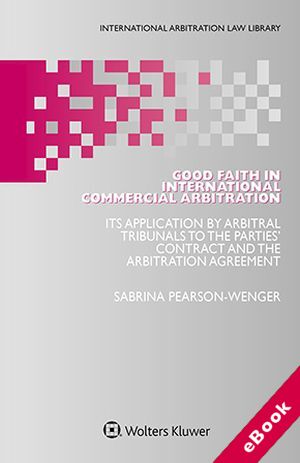
The device(s) you use to access the eBook content must be authorized with an Adobe ID before you download the product otherwise it will fail to register correctly.
For further information see https://www.wildy.com/ebook-formats
Once the order is confirmed an automated e-mail will be sent to you to allow you to download the eBook.
All eBooks are supplied firm sale and cannot be returned. If you believe there is a fault with your eBook then contact us on ebooks@wildy.com and we will help in resolving the issue. This does not affect your statutory rights.
Good Faith in International Commercial Arbitration is the first of its kind to study in depth the available international arbitral awards that have applied good faith, thus providing detailed guidance on how this notion is (and can be) applied by tribunals in international commercial arbitration. By doing so, this book addresses the uncertainties surrounding the application of good faith by arbitral tribunals, which has created an unwelcome unpredictability with respect to the application of this notion. Moreover, the author proposes a set of deeply informed guidelines for the future application of good faith by arbitral tribunals to both the parties’ contract and the arbitration agreement.
What’s in this book:
This book furnishes a comprehensive description of the role and scope of good faith under governing laws in key jurisdictions (England, New York, Switzerland, France, Germany, China, Singapore, Hong Kong, Australia, and Canada) as well as under the CISG, the UNIDROIT Principles, and other uniform law and soft law instruments. It examines how good faith has been applied by arbitrators to the parties’ contract and elucidates the source and role of good faith concerning the following issues surrounding the arbitration agreement:
Proposed guidelines for applying good faith to the parties’ contract and to the various issues surrounding the arbitration agreement, along with figures summarizing the content of the obligations to negotiate or mediate in good faith prior to resorting to arbitration and the obligation to arbitrate in good faith.
How this will help you:
This book will be highly appreciated as it analyses the role and scope of good faith under the most popular governing national and non-national laws and provides not only invaluable insight into how good faith is applied by arbitral tribunals to the parties’ contract in international commercial arbitration but also guidance on how good faith should be applied to this contract. Arbitrators, as well as users of arbitration, will welcome the clarity on how good faith is applied to the various issues surrounding the arbitration agreement and, in particular, to the pre-arbitration requirements to negotiate or mediate in addition to the performance of the arbitration agreement.